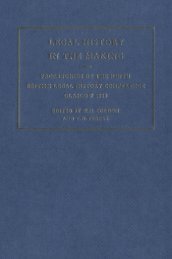130. - Collection Point® | The Total Digital Asset Management System
130. - Collection Point® | The Total Digital Asset Management System
130. - Collection Point® | The Total Digital Asset Management System
Create successful ePaper yourself
Turn your PDF publications into a flip-book with our unique Google optimized e-Paper software.
3. <strong>The</strong> Structure of Individual Sections of Zechariah 175<br />
•?3«, vv. 4, 15. Otherwise only 7.6.##2,7; 11.1, 9, 16; 12.6. In<br />
ch. 7 the meaning is literal; in chs. 9-14 it is figurative of destruction.<br />
"j^D, vv. 5, 9. <strong>The</strong>re is a strong contrast here: 'the king will perish<br />
from Gaza...O Zion, Your king comes to you'. Elsewhere in<br />
Zechariah the word is found in 7.1 ('King Darius' in a date formula),<br />
11.6, 14.5, 9, 10, 16, 17 (in which vv. 9 and 16-17 refer to Yahweh<br />
as the king). <strong>The</strong>re is an obvious connection between 9.9-10 and these<br />
verses in ch. 14.<br />
rro, 9.6, 10.##1,6. All these refer in some way to the establishment<br />
of peace in Israel. <strong>The</strong> pride of the Philistines, the chariot and the<br />
battle bow, will be cut off. Elsewhere the word occurs in Zechariah<br />
only in 11.10 (in the phrase 'covenant which I cut') and 13.2, 8 (both<br />
referring to judgment).<br />
D'ii^K, 9.7, 16, is comparatively rare in Zechariah. It occurs in<br />
expressions such as 'Yahweh your God' or 'I will be their (etc.) God'.<br />
Verse 16, which contains the first type of expression, also reflects the<br />
second ODJ> ]»»). Verse 7 speaks of Philistia as a remnant 'to our<br />
God'. <strong>The</strong>re is no warrant, therefore, for ignoring this word, but<br />
rather confirmation that it is significant in Zechariah. Again, the<br />
connection is not within vv. 1-8.<br />
mvr, 9.7, 13. Otherwise 1.12; 2 (4x); 8 (3x); 10.3, 6; 11.14; 12.2-7<br />
(6x); 14.5, 14,21.<br />
-Qi>, 9.8.##4,7. Also 3.4 (hiphil); 7.14; 10.11; 13.2 (hiphil). <strong>The</strong><br />
unusual expression ntfoi "ODD also occurs in 7.14.<br />
312), 9.8 (netoi -OBO), 12.##1,9 ('Return!'—'I will cause to return'<br />
[i.e. 'restore']). Also 10.9, 10 ('return', 'cause them to return [from<br />
Egypt]'; both used of blessing); 13.7 in chs. 9-14 (see above for<br />
chs. 1-8). Zech. 9.12 and 10.9-10 correspond well to each other. I<br />
wonder if there is an intentional contrast between the lack of "ni> and<br />
aitf in 9.8, and the promise of both in 10.9-11, but it is impossible to<br />
demonstrate this or to build on it.<br />
In examining repeated words in the section 9.1-11.3, we have discovered<br />
some surprising and possibly significant facts.<br />
1. <strong>The</strong>re does not seem to be much correspondence within the<br />
section 9.1-8, certainly less than in any of the small sections<br />
that we examined in Zechariah 1-8. <strong>The</strong> only plausible theory<br />
of intentional structuring would have to be based on the names<br />
of Philistine cities, and the textually doubtful ]'a (see below).






